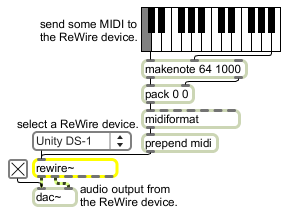Examples

rewire~ allows MIDI communication to and signal output from ReWire compatible devices
Host ReWire devices
| Name | Type | Opt | Description |
|---|---|---|---|
| rewire-device-name | symbol | opt | If present, a ReWire device name can be specified. rewire~ will attempt to open the device when the object is initialized. |
| number-of-audio-outputs | int | opt | Specifies the number of audio outputs the rewire~ object will have. If no argument is present, one audio outlet is created. The maximum number of outlets is 256. |
| bang | In left inlet: If a ReWire device has been loaded, causes a list of its output channel names to be sent out the second-from-right outlet. | |
| int | transport-start/stop-flag (0 or 1) [int] |
In left inlet: starts the ReWire transport, stops it. No sound can occur without the transport being started. |
| anything | rewire-device-name [list] |
In left inlet: The symbol is interpreted as the name of a ReWire device. If the name is valid, rewire~ attempts to switch to the device. |
| closepanel | In left inlet: Closes the current device's user interface panel if it is open. | |
| device | device-index [int] |
In left inlet: The word , followed by a number, switches to the ReWire device associated with the number index. The index is obtained as the order in which device names appear in a pop-up menu object connected to the second-to-right outlet. |
| loadbang | Same as but the action is performed upon loading the patch within which the rewire~ object is performed. | |
| loop |
start-point (samples) [int] end-point (samples) [int] loop-flag (0 or 1) [int] |
In left inlet: The word , followed by three numbers, sets the current loop position and mode. The first number sets the loop start position in samples. The second number sets the loop end position in samples. If the third number is 1, looping is turned on. If the third number is 0, looping is turned off. However, note that ReWire clients may ignore looping if they do not produce transport- or time-based output. For example, a software synthesizer that only responds to MIDI note commands would probably not be affected by looping. |
| map | device-output-channel and object-outlet [list] |
The word , followed by two numbers, maps a ReWire device's output channel to an outlet of the rewire~ object. ReWire channels start at 1 with a maximum of 256. rewire~ object outlets are specified starting at 1 for the left outlet, or 0 to turn the ReWire channel off. For example, causes the ReWire device's audio output channel 3 to be mapped to the second-from-left outlet of the rewire~ object. You can find out the names of the ReWire audio output channels with the message after the rewire~ object has a connection to a ReWire device. By default, audio outlets map to the first channels of the ReWire device; in other words, the leftmost signal outlet outputs the first channel of the device. |
| midi | time-stamp MIDI-bus-index MIDI-message-status-byte and MIDI-message-data-bytes [list] |
In left inlet: The word , followed by four or five numbers, sends a MIDI event to a ReWire device. The first number is a time stamp value and is currently ignored (in other words, the event is sent out immediately). The second number is the MIDI bus index. ReWire 2 has 256 MIDI busses, indexed from 0 to 255. The third number is the MIDI message status byte, and the fourth and fifth numbers are the MIDI message data bytes. |
| openpanel | In left inlet: If the current device has a user interface panel, the word will open it. | |
| play | In left inlet: Starts the ReWire transport. | |
| position | play-position (samples) [int] |
In left inlet: The word , followed by a number, sets the current play position (in samples). |
| stop | In left inlet: Stops the ReWire transport. | |
| tempo | beats-per-minute [float] |
In left inlet: The word , followed by a number, sets the tempo to that number in beats per minute. ReWire handles integer or floating-point valude for tempos, and tempo is updated on the next call to the client to return audio samples. |

| Name | Description |
|---|---|
| vst~ | Host VST plug-ins |